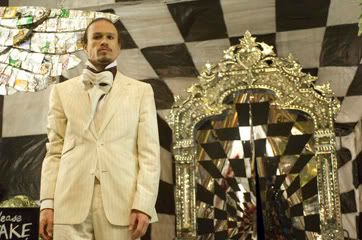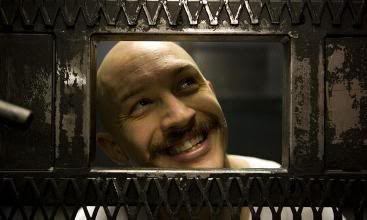

It's "Oy Ve!" over and over again in "A Serious Man." If pain and suffering is the root of all laughter, then Joel and Ethan Coen's new film is hilarious. And it is one of brilliant comic cruelty. Here's a comedy so black that its underlying philosophical outlook on life and fate is so hopeless and bleak that it rivals "No Country for Old Men." The Oscar-win for the writing-directing duo has allowed them to make their most original and personal feature yet. They deal, for the first time, with their Jewish heritage in placing the setting in a 1967 suburb, one that resembles the Minnesota town in which they grew up. This entry proves now more than over that the Coens are a master of the craft. The direction is keen and the script plays out like a richly textured novel, one tinged with the hilarity of cosmic despair.
Larry Gopnik (Michael Stuhlbarg) has always tried to be a serious man. He's convinced there's reason to everything in the world. Is there? The Coens are convinced otherwise, and in close relation to "No Country for Old Men," the brothers have a fascinating interest in a fundamental absence of there being meaning to anything. Man's attempt to find that meaning becomes a futile search. The movie opens with a prologue spoken in Yiddish that tells an ancient tale of a couple who either rid their house of a dybbuk (a ghost) or murdered an old man. It's the proclamation of an evil curse, one that we see play out in Larry's life. His wife (Sari Lennick) wants a divorce, his candidacy for tenure at his job as a professor is under fire, his son (Aaron Wolf) has his bar mitzvah coming up when he's more interested in experimenting with pot, and their Uncle Arthur (Richard Kind) is living on the couch draining the fluid out of his cyst while writing in a notebook filled with mad, mystical physics.
Larry is constantly bombarded with requests, message, phone calls, demands, and complaints, and the performances from mostly unfamiliar actors reflect this hectic feeling through tart and dry dialogue. Larry's daughter (Jessica McManus) complains about Uncle Arthur taking up the bathroom all the time when she needs to style her hair, Larry's son needs the reception fixed on the TV so he can watch "F Troop," a student from South Korea (David Kang) bribes and blackmails Larry with money for a better grade, Larry keeps getting calls from Columbia Record Club requesting payments, his neighbor is encroaching on the property line in their lawn, and the list goes on and on. Every tiny incident in Larry's life takes on a hugely sinister tone, and it just keeps building up. The Coen's focus on the mundane banality of the American Jewish lifestyle is presented like a loopy circus show. All of the inconveniences, they keep piling up, interrupting and contradicting each other, and they all amount to absolutely nothing. And this was four decades ago. Imagine now.
The movie is shot with such exquisite artistry and inventiveness thanks to cinematographer Roger Deakins. Every angle (canted angles included), every choice of framing, and every character (no matter how minor) have significance toward the grander theme. Consider Larry's sexy neighbor, Mrs. Samsky (Amy Landecker), who is like an angel wearing an orange sweater and black eyeliner promising an escape, or Sy Ableman (Fred Melamed) who is stealing away Larry's wife. Sy becomes a permeating presence, a guidance counselor who guides only the grief he supplies.
In endlessly wondering why everything goes wrong for him, the "Why me? Why me?" mentality, Larry seeks absolution from the advice of three rabbis. The senior rabbi tells the story of a dentist who found the Hebrew words for "Help me" engraved in the back of a patient's teeth. One rabbi finds explanation in the simplicity and wonder of the parking lot outside. Another rabbi ends up being helpful in listing off the members of Jefferson Airplane, a band whose song "Somebody to Love" becomes the moral backdrop and ultimate punch line for the entire movie.
During one of his lectures, Larry presents a mathematical equation that takes up the entire blackboard and deals with the concept of uncertainty. And yet isn't math based all around certainty and theorem? Well, yes, this is a certain theorem on uncertainty. How is that at all reasonable? How is it reasonable that the culmination of the results of an x-ray and the onset of a tornado attribute to the same thing? From its fable-like beginning to its offbeat but pitch-perfect ending, "A Serious Man" delivers what the Coen brothers do best, and it is a work of serious accomplishment. It would appear that the only thing certain in life is the existence of suffering.













